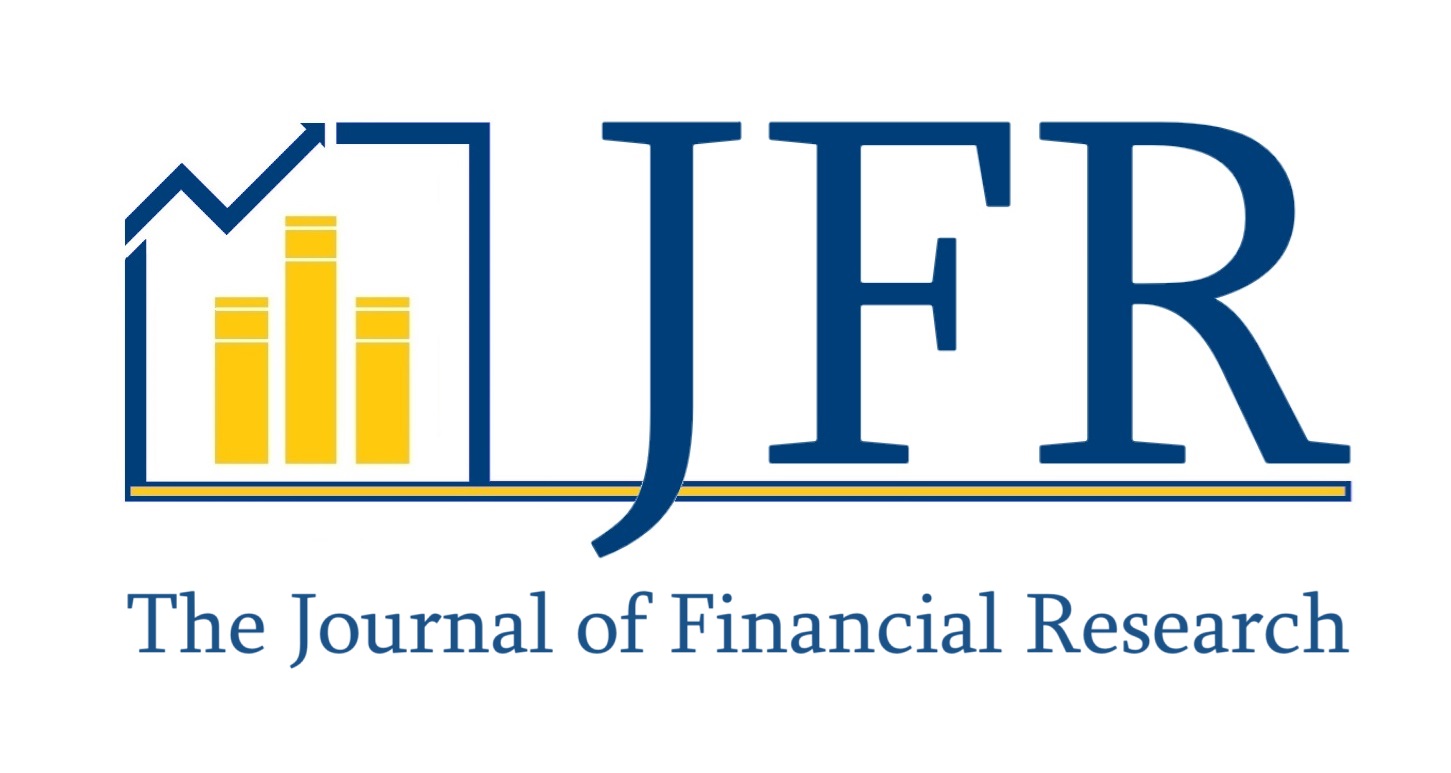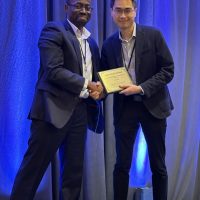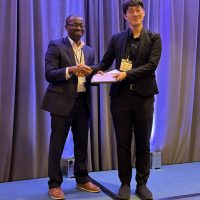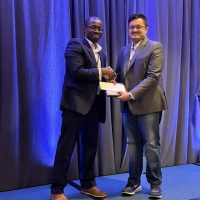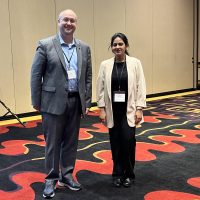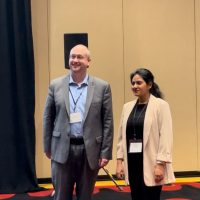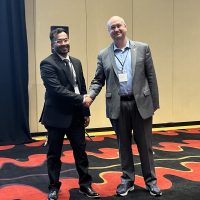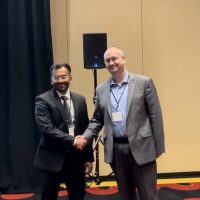JFR Sponsored Awards
Southwestern Finance Association, Spring 2025 (San Antonio, TX)
Best Paper in Asset Pricing:
A Quantum Leap in Asset Pricing
Jianhua Huang, Huiling Liao, Wei Liu, and James Kolari
This paper utilizes open source datasets of anomaly portfolios to conduct cross-sectional regression tests of alternative asset pricing models. Out-of-sample analyses of anomaly portfolio returns show that a recently proposed model dubbed the ZCAPM consistently outperforms leading multifactor models in terms of factor loading significance and goodness-of-fit. Also, the ZCAPM markedly outperforms multifactor models in graphical analyses of pricing errors that compare realized returns to predicted returns on an out-of-sample basis. Further subperiod analyses corroborate these findings. Supporting the efficient market hypothesis, the ZCAPM well explains large numbers of anomaly portfolios’ returns on an out-of-sample basis.
Best Paper in Corporate Finance:
Social Jetlag and Heuristic Analyst Forecasts
Sima Jannati
This paper examines whether social jetlag—the misalignment between an individual’s social and biological clocks—affects the heuristic behaviors and career outcomes of sell-side analysts. The findings indicate a higher propensity for herding behavior among analysts prone to social jetlag, evident in both their earnings forecasts and stock recommendations. Furthermore, these analysts are more likely to exit the profession. Importantly, these results cannot be attributed to the analysts’ capabilities in collecting information about the firms they cover. As the alignment between the social and biological clocks of analysts improves, the impact of social jetlag on the use of heuristics in forecasting diminishes. Overall, these findings contribute to the behavioral finance literature by highlighting the role of unbiased information processing
Best Paper in Investing:
Gender and Risk Perception in Financial Investments
Augustine Tarkom
This study revisits and examines gender differences in financial risk attitudes using a novel, U.S. household dataset at the state and individual level from the National Financial Capability Study. Grounded in evolutionary psychology, I propose that gender differences in risk-attitude have deep-seated biological and social roots. The analysis reveals persistent female risk aversion in financial investments, though this tendency has changed over time. A decomposition analysis identifies education, income, and employment status as key drivers of gender differences in risk attitudes. Factors such as financial education, knowledge, and economic circumstances influence risk attitudes, while gifts and inheritances do not. Especially, pandemic stimulus payments appear to moderate gender-risk attitudes. These attitudinal differences translate into investment choices, with females favoring retirement accounts over non-retirement investments. These findings have significant implications for understanding the gender wealth gap and inform strategies to promote financial inclusion and gender equality in investment decision-making.
Augustine Tarkom accepts award for Best Paper in Investing from SWFA VP-Programs, Nacasius Ujah.
Best Paper in Real Estate:
Single-Family REITs and Local Housing Markets
Marco Giacoletti, Rawley Heimer, Wenli Li, and Edison Yu
Institutional investors in single-family housing markets are often represented as worsening household well-being. We document the growth of single-family REITs (SFRs) and their (non-)effects on housing markets by constructing a novel dataset of SFRs’ underlying properties. SFRs purchase properties in neighborhoods encircling city centers, where housing supply is more elastic, and with populations facing homeownership barriers. Using a spatial differences empirical strategy, SFR growth relates to increased housing supply, lower mortgage approval rates, and modest price increases. These findings likely capture SFRs’ selection of neighborhoods rather than causal effects. SFR asset returns mirror representative housing portfolios despite their concentrated holdings.
Edison Yu accepts award for Best Paper in Real Estate from SWFA VP-Programs, Nacasius Ujah.
Best Doctoral Paper in Asset Pricing:
Mutual Fund Managers and Prospect Theory Preference
Alaia Qin and Xiaan Zhou
We examine preferences implied by prospect theory in mutual fund settings. By aggregating holdings of all active equity mutual funds to stock level, we find a significantly positive relation between a stock’s prospect theory (TK) value and its holding tilt measured by the deviation of the holding weight in the aggregate active equity mutual fund from the benchmark portfolio. Specifically, a 1-SD increase in a stock’s TK value will increase the holding tilt by 100% on average. By holding stocks with high TK value, fund managers cater to their investors to attract more fund flows. In particular, among fund managers, those with higher fund ownership have significantly weaker prospect theory preferences. Furthermore, we decipher the cost and benefit of holding stocks with high TK value: it will lower future fund performance but attract more fund flows.
Best Doctoral Paper in Corporate Finance:
A Little Seasoning Goes a Long Way
Jewon Shin
Two policy experiments around recent changes in mandatory disclosure requirements indicate that mandatory disclosure burdens suppress the investment of newly public firms, but this effect attenuates after approximately three years. Consistent with the effect being driven by manager-investor information asymmetry, the initial three-year effect and subsequent attenuation concentrates in R&D (as opposed to capital expenditures) and among firms that go public within 5 years of their founding date or that have few dedicated investors. Changes in disclosure burdens do not predict changes in the investment of more seasoned firms, except when focusing on the R&D of firms founded within ten years.
Jewon Shin accepts award for Best Doctoral Paper in Corporate Finance from SWFA VP-Programs, Nacasius Ujah.
Best Doctoral Paper in Investments:
Is the trading Pattern of Foreign Institutional Investors Prior to IPOs Indicative of their Interest in the IPO Stocks?
Somak Mukherjee
We propose a proxy to measure the interest of Foreign Institutional Investors (FIIs) in Initial Public Offering (IPO) stocks based on their pre-IPO trading patterns. Depending upon their assessment of an upcoming IPO vis-a-vis their broad equity market outlook, FIIs can either bring in fresh funds or rebalance their portfolios to finance their investments during the IPO bidding phase and post listing trading. We find evidence that when FIIs’ interest in an IPO stock is not driven primarily on the basis of the overall equity market performance, the propensity of the FIIs to flip IPO stocks and execute round-trip sell trades on the day of IPO listing is lower. Our proxy also helps us explain the differences in the immediate post listing liquidity of the IPO stock. Additionally, our results show that based upon the FIIs’ interest in an IPO stock, there is a significant difference in the post-listing performance of the stocks, indicating that FIIs can distinguish between the bad IPO stocks and the good IPO stocks stocks ex-ante.
Somak Mukherjee accepts award for Best Doctoral Paper in Investments from SWFA VP-Programs, Nacasius Ujah.
Southwestern Finance Association, Spring 2024 (Las Vegas, NV)
Best Paper in Corporate Finance:
Human Capital Reallocation and Agglomeration of Innovation
Jing Xue
This paper identifies the reallocation of human capital as a key channel of agglomeration spillovers for innovative firms. To measure agglomeration spillovers, I study how R&D labs in different local labor markets respond differently to scientific breakthroughs, which create large and unexpected shocks to innovation productivity in certain technology categories. Taking advantage of U.S. Census longitudinal establishment data matched with patent records, I systematically locate R&D labs in all local labor markets for each firm. I document four main findings. First, following scientific breakthroughs, affected labs in thicker local labor markets (i.e., commuting zones with more inventors innovating in a certain field) produce more patents and higher-quality patents, consistent with positive agglomeration spillovers. Second, the increase in patenting is mostly attributed to new hires rather than incumbent inventors. Third, the thick labor market effect is concentrated in states and industries where there is lower enforceability of non-compete agreements and labor is more mobile. Finally, using textual analysis to identify lab-level exposure to scientific breakthroughs, I find that inventors are reallocated to labs that are more favorably affected by shocks, which helps labs in thicker labor markets to more easily bring in inventors working in the same niche fields and having a diverse knowledge base. Taken together, these results point to labor mobility as a key force in explaining why innovative firms cluster, and suggest that the clustering of firms in thick labor markets can foster corporate innovation by facilitating productivity-enhancing reallocation of human capital following scientific breakthroughs.
Best doctoral submission in Corporate Finance:
* Insider Filing Delay and Corporate Misconduct
Brandon Cline, Caleb Houston, and Junnatun Naym
Delinquent insider trade reporting is a violation of securities law. Although these violations may appear insignificant, they indicate a firm’s broader culture of noncompliance, which can lead to other forms of misconduct. Using a panel dataset of 23,654 firm-year observations, we test the association between insider filing violations and future corporate misconduct and document a significant positive association. This effect is strongest for firms that do not have a CCO or internally imposed blackout trading restrictions. These findings suggest that implementing a strong internal regulatory system fosters a culture of compliance and establishes checks and balances within the firm.
Doctoral student, Junnatun Naym, accepts award for best doctoral submission from SWFA vice president, Andrew Lynch.
Best doctoral submission in ESG:
* CEO Cultural Heritage, CSR, and Firm Value
MD Showaib Rahman Sarker, Ahmed Elnahas
We examine the impact of CEOs’ cultural heritage on corporate social responsibility. CEOs originating from countries with high Power Distance, more Uncertainty Avoidance, and Long-term Orientation have high CSR scores, while those originating from Individualistic and Indulgent cultures have low CSR scores. This effect lasts up to three generations before it disappears due to acculturation. These results are robust to using difference-in-difference estimate, propensity score matching, entropy balancing, and Oster’s test to address endogeneity and selection bias. Our factor and machine learning (K-means clustering) analyses shed additional light on the countries of origin of high and low CSR performers.
Doctoral student, Md Showaib Rahman Sarker, accepts award for best doctoral submission from SWFA vice president, Andrew Lynch.
*denotes doctoral student
